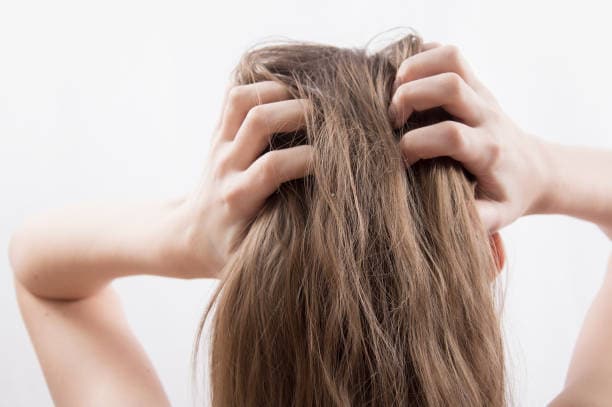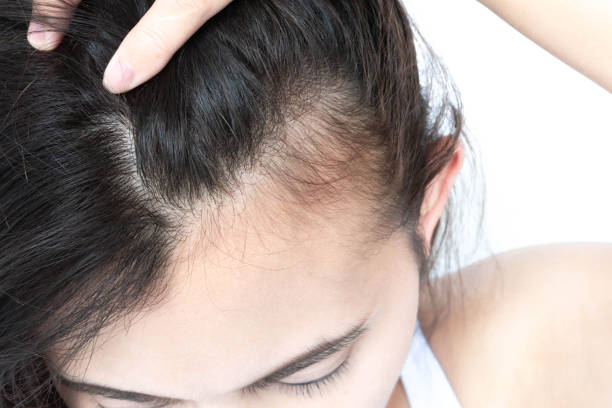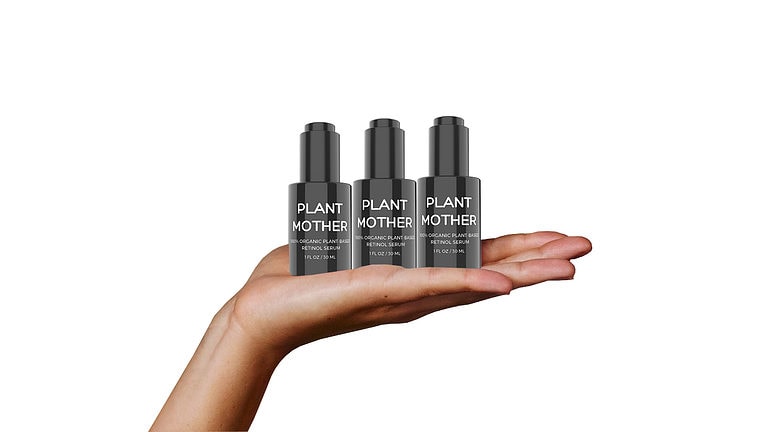Reasons For Itchy Scalp And How To Get Relief

INTRO
If your head is itchy, don’t panic! Whenever my head itches, the paranoia starts. It must be lice! Without fail, I always get the urge to burn all my bedding and start running a fine-toothed comb through each individual strand of hair. But don’t go all scorched Earth just yet! There are so many reasons for an itchy scalp. No matter the cause, there’s a solution out there. And, of course, we’re here to help.
Why Is My Scalp So ITCHY?
Okay, let’s get the creepy crawlies out of the way first. Head lice are small, but not microscopic. You should be able to spot some if they’ve made a home in your hair. If you think you might have lice, enlist a brave friend or relative to take a comb and look carefully for any unwanted guests. A call to the doctor or a quick Google search will let you know how to kick the critters out of your life.
Creepy crawly potential culprit #2: scabies. This is the last one, I promise! If you notice a rash on your face or experience some intense scalp itchiness, you should see a doctor ASAP. A doctor can properly diagnose you and provide prescription-grade treatment to get you some much-needed scalp relief.
The itchy scalp could also be caused by dandruff. If you’re regularly finding white flakes on your beard, hair, eyebrows, or even shoulders, dandruff is likely the cause. Dandruff can be exacerbated by a dry winter or even stress. If it is dandruff, switching to a dandruff shampoo should clear it up. If that doesn’t do it, you might need to seek help from a medical professional. A physician or dermatologist can get you medicated shampoo.
There are several common skin conditions that cause head scratching. Eczema, also known as atopic dermatitis, is one such condition. There are many signs of eczema—and you needn’t check every box to be diagnosed. Some individuals may experience skin that oozes pus, others might experience skin swelling and rash, and others might have angry red itchy skin, etc.
Additional Causes Of Itchy Scalp
Another itchy skin condition is scalp psoriasis. This one also looks different depending on the individual. Common symptoms include “plaques”, or areas of skin that itch, scale, cause pain, and look swollen/raised above the normal skin level. If you are Caucasian, these sites might look silver and red. If you are a person of color, it might look less like silver or red. Instead, it will appear as a shade of darker brown, gray, or purple.
Allergies can cause plenty of hives and unwanted scalp scratching. It could be from the particular hair dye you used, or your shampoo/hair product. If you recently switched products before the itching began, consider switching products once more and observe for changes. If this works, be sure to take note of the ingredients in the offending product that might be to blame. You won’t want to use products with those ingredients in the future!
Scalp ringworm. I know what you’re thinking—I promised no more creepy crawlies! But despite their disgusting name, scalp ringworm comes from a type of fungus. Even without actual worms, however, this infection is no joke. It can cause hair loss, bumps, and severe rash. Again, you’ll need a doctor’s help to heal.
Believe it or not, your lifestyle and eating habits could be causing the itchiness. If you over-wash your hair or use too strong of a hair product, you could end up stripping your scalp of necessary oils. Your skin secretes a natural oil that greatly helps your scalp. If you upset that balance, you may very well end up with a dry, irritated, or itchy scalp. Eating a healthy diet and staying hydrated are important as well when it comes to maintaining healthy skin. Remember: dehydrated skin can often be itchy.

ITCHY SCALP Treatment
Even if you aren’t currently scratching, it’s unlikely that you want to be in the near future. No one wants that discomfort! Some itchy scalps can be so severe that they impair your ability to function or sleep. If you want to prevent an itchy scalp before it can start, we’ve got some handy tips!
These are all really easy to do, and extremely beneficial for your scalp. Step one is to avoid applying chemicals (including fragrances and dyes) to your hair. This could mean skipping your usual perm or dye job. Keep your skin moisturized and your body nourished with water. This is a hard one for me—I’m constantly forgetting to drink water throughout the day. Carrying around a reusable water bottle is a great way to remind yourself to take sips of water. Using a hair treatment before you wash it or using an apple cider vinegar rinse once a month will benefit you and your skin as well.
To prevent head lice, it’s a good practice to avoid sharing things like ponytails, scrunchies, combs, hats, and brushes. Anything that goes on someone else’s head probably shouldn’t go on yours. Most of the causes of an itchy scalp are not contagious, but head lice most definitely are.
TREATING AN ITCHY SCALP NATURALLY
There are countless natural remedies for an itchy scalp. Some conditions require medical intervention for successful treatment, so you’ll want to have a good idea about what’s causing your itchy scalp before you start trying to treat it solo. But if you’re confident that this is manageable with at-home remedies, we’ve got some suggestions for you.
Apple cider vinegar tops so many lists for natural remedies, and for good reason. It’s best to do a patch test first, as you might have to dilute the vinegar to avoid a burning/uncomfortable sensation. This versatile product is effective against psoriasis, too.
Organic coconut oil is a great choice for dry, itchy scalp. The benefits of coconut oil are that it’s easily accessible and extremely low maintenance. You can warm it up and apply it to your scalp for half an hour before shampooing or simply leave it in when you go to bed. This is not a daily solution, however—once a week is best.
If you’d rather not make a grocery run, just open your kitchen cabinet for this next treatment. Apply some olive oil onto the itchy scalp to rid yourself of pesky scales from skin conditions like eczema. After an hour of olive oil hair, you can wash it off. With any luck, the skin scales will wash out with it!
This is another overnight natural treatment, and a little goes a long way. Apply a maximum of ten drops of Tea tree oil (minimum of five) to your scalp and rub it in well. Then go to bed. Wash it out in the morning, easy as that! Be sure not to overdo it. Repeating this process three times a week is plenty.
With some of these treatments, if there’s no improvement, or your condition worsens, it’s time to see a medical professional.
WHAT NOT TO USE WHEN YOU HAVE AN ITCHY SCALP
As we mentioned earlier, it’s important to avoid chemical treatments whenever you can. Chemicals are harsh and can be extremely irritating. A non-toxic product with natural ingredients can be extremely effective while treating your skin gently.

TAKING CARE OF YOUR SKIN
The skin doesn’t end at the forehead, either. Keeping all of your skin healthy is essential. When it comes to the skin on your face, there’s no better product duo than Plant Mother’s retinol and Vitamin C serum. Let us show you why!
Plant Mother’s organic retinol serum works amazingly well and is full of essential nutrients for your skin. And, because Plant Mother makes exclusively vegan skincare, this vegan retinol serum doesn’t come with the negative side effects traditional retinols come with. This retinol does not cause irritation, redness, or dryness. Instead, it nourishes and rejuvenates your skin with a solution full of natural antioxidants, and vitamin-rich plants. For example, the serum contains the famous “botanical face-lift” AKA Bakuchiol. This plant has been a staple in traditional Chinese medicine, renowned for its incredible ability to reduce visible signs of aging.
Plant Mother’s Vitamin C serum is also organic, and plant-based. This serum brightens the skin, evens out skin tone, and lessens hyperpigmentation. It promotes collagen production, combats free radicals, and speeds up your skin’s natural skin cell regeneration process. This Vitamin C serum is waterless and oil-based for a richer and more potent effect. Plant Mother only uses the best and cleanest locally sourced ingredients for the Vitamin C serum.
If you opt for the duo Vitamin C and retinol serum, we recommend using the Vitamin C serum during your morning routine and the retinol serum at night. These work great together, but you should not apply them at the same time.
CONCLUSION
We were definitely not able to cover every cause of an itchy scalp, or even scratch the surface of each natural remedy. We hope that this serves as a helpful jumping-off point for your own research. And, when in doubt, try to schedule an appointment with a dermatologist. It’s not admitting defeat to seek help—several itchy scalp culprits just can’t be eradicated alone.
There are some awful misconceptions that people with skin issues like head lice are simply “dirty” or “unhygienic.” This is very far from the truth. In fact, lice prefer clean hair. Remember not to judge anyone, especially yourself, for something entirely out of your control. Best of luck in your skincare journey, and I hope your scalp gets better soon!
MEDICAL DISCLAIMER
This content is for informational and educational purposes only. It is not intended to provide medical advice or to take the place of such advice or treatment from a personal physician. All readers of this content are advised to consult their doctors or qualified health professionals regarding specific health questions. The publisher of this content does not take responsibility for possible health consequences of any person or persons reading or following the information in this educational content. All viewers of this content, especially those taking prescription or over-the-counter medications, should consult their physicians before beginning any nutrition, supplement, skincare product, or lifestyle program.
